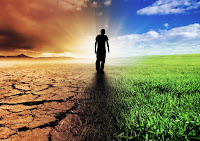Others have tried to grasp the whole picture. In 2014 the United Nations’ Intergovernmental Panel on Climate Change sparked headlines with its calculation that helping developing nations cope with climate impacts could cost the world half a trillion dollars annually by midcentury. That’s the low estimate should the world not find a way to meet the 2 degree goal set at the Paris Climate Talks.
When looking at these estimates and making the economic case for climate action, I find it helpful to think of three big ways climate change affects the bottom line:
- Cost of disasters
While no one storm, drought, tornado or flood can be specifically attributed to climate change, we do know with certainty that climate change will make extreme weather events like Hurricane Katrina, the 2012 western wildfires and California drought more frequent and severe. In 2015 the National Oceanic and Atmospheric Administration (NOAA) counted 10 billion-dollar disasters from floods in South Carolina to wildfires in Alaska. While each year is idiosyncratic, the trend is clear: In the last 35 years we’ve seen an increasing number of billion dollar disasters. NOAA itself admits that, if anything, their dollar estimates are systematically too low.
Wrapped into this is the cost of dealing with the change that’s already inevitable, including several feet of sea level rise.
... - Cost of displacement
Climate change is poised to exact a massive toll on people and communities. That can be measured not just in the human cost, but also in the real cost of displacement of people and commerce and resulting conflict.
... - Cost of delay
By failing to square with climate change and make changes decades ago, we’ve already set unstoppable environmental changes into motion. This means that we no longer have the choice between reducing carbon pollution and adapting for a warmer climate. We have to do both. But the longer we wait while continuing to emit large quantities of carbon, the more we’ll need to cut to avert catastrophe. This will create a bigger disruption in the world economy with profound impacts for industry, government and individual incomes, financial security and quality of life.
...
The numbers make the way forward clear: Not only is it unethical to continue on our destructive [way], we simply cannot afford inaction on climate.

No comments:
Post a Comment